| کد مقاله | کد نشریه | سال انتشار | مقاله انگلیسی | نسخه تمام متن |
|---|---|---|---|---|
| 2414500 | 1552094 | 2012 | 15 صفحه PDF | دانلود رایگان |

This study investigated the effects of grassland management and climate on the exchanges of carbon dioxide (CO2) (i.e. net ecosystem CO2 exchange, NEE; gross ecosystem production, GEP; and ecosystem respiration, ER) and energy (i.e. latent heat flux, LE; sensible heat flux, H; and Bowen ratio, β) in an intensively managed grassland in the maritime climate of southeast Ireland using six years (2004–2009) of eddy-covariance data. The observed effects on CO2 (reduction of net CO2 uptake (i.e. NEE), GEP and ER) and energy exchanges (LE decreased while H and β increased) were more pronounced following harvest compared to grazing practices and were further dependent on their seasonal timing. Most importantly, a net loss of CO2 occurred for 2–3 weeks following harvest whereas net uptake continued during grazing periods. Whereas the environmental conditions were in general non-constraining and similar among years, the predominant annual management regime varied widely among years including cattle grazing, grass harvesting, kale planting, and grass re-seeding. For the years 2004–2009, the NEE was −385, −202, −109, +134, −101, and −201 g C m−2 year−1 (negative sign indicating uptake) and the mean growing season midday β was 0.97, 0.66, 0.82, 1.07, 0.78 and 0.79. During similar environmental conditions, about twice as much annual CO2 uptake and greater H flux occurred under the cattle grazing regime in 2004 compared to the grass harvesting regime in 2005. Kale planting and re-seeding during the early summer likely caused the reduced annual CO2 uptake in 2006 and net emission combined with a greater β in 2007. A 2-week drought period in summer 2006 further affected GEP, ER and energy fluxes, while its impact on NEE was limited. Recognizing additional effects from climate, this study finds that the choice of grassland management regime is a key control on grassland ecosystem carbon, water, and energy exchanges in this maritime climate region.
► Grazing and harvest practices affected grassland CO2 and energy fluxes differently.
► Grazing resulted in greater annual CO2 uptake and higher Bowen ratio.
► Seasonal timing of management events further affected CO2 and energy fluxes.
► Kale planting and re-seeding reduced CO2 uptake and increased the Bowen ratio.
► Management is the main control on carbon and energy budgets in maritime grassland.
Journal: Agriculture, Ecosystems & Environment - Volume 158, 1 September 2012, Pages 132–146